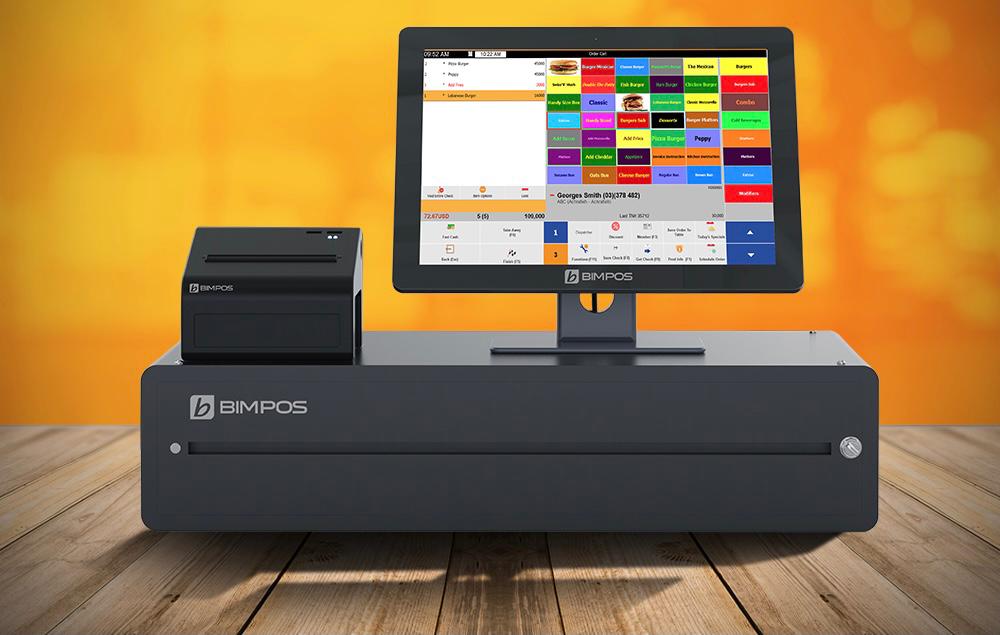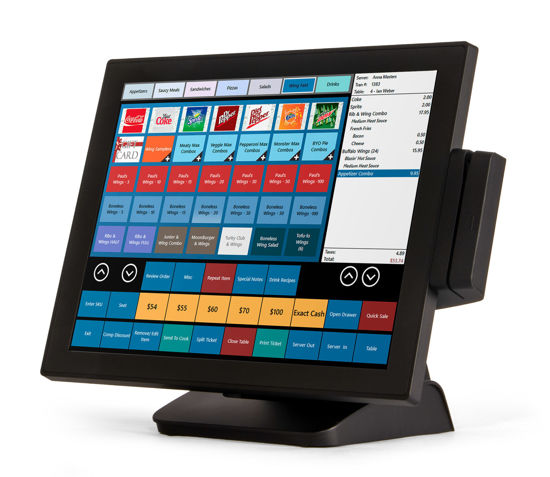A Biased View of Restaurant Pos
A Biased View of Restaurant Pos
Blog Article
The 4-Minute Rule for Pos Software

Point of Sale Software: Retail Point-Of-Sale Solutions Streamline Transactions
Clover Pos - Questions

Hardware Components of a Point of Sale System What makes a POS system tick? It's not simply software application; the hardware plays a starring function. Think about it as the body to the software's brain. Without the right hardware, even the most advanced POS software is just a quite face. Essential POS Hardware So, what are the must-haves? Let's simplify. The main processing unit, frequently a computer system or tablet, is the heart of the operation. The monitor or touchscreen display enables staff here to engage with the system. A barcode scanner speeds up the checkout procedure. Remember the days of by hand going into each code? The trusty invoice printer offers clients with a record of their purchase. A money drawer keeps your cash safe and arranged. A card reader allows consumers to pay with credit or debit cards. Diving Deeper: Beyond the Fundamentals However wait, there's more! Depending upon your organization, you might require specific hardware. For example, a restaurant might include cooking area printers to relay orders, while a retailer might utilize label printers for item tagging. Ever question how your local pastry shop quickly prints those delicious-looking labels? Choosing the Right Hardware: A Balancing Act Choosing the best hardware isn't practically purchasing the most pricey devices. It's about finding the sweet area in between functionality, sturdiness, and spending plan. A little company just starting might choose a more basic setup, while a high-volume merchant will require robust, high-performance makers. Is it better to buy new or utilized? Consider your choices carefully. A brand-new system uses the current innovation and warranty defense, but a reconditioned system can save you cash. The Future of POS Hardware What does the future hold? Expect to see much more integration with mobile devices, biometric scanners for employee authentication, and advanced analytics dashboards displayed on bigger, clearer screens. Picture a world where stock is immediately updated in real-time as products are scanned-- a world where you can track your best-selling item from throughout the world. The possibilities are limitless, and the hardware is constantly progressing to satisfy the demands of today's services. Are you ready to update your point of sale system?
Software Application Features and Capabilities: The Heart of Your POS System
Ever view a seasoned barista slide through a hectic early morning rush? Their secret isn't simply caffeine; it's a seamless dance with their POS system. The software application is the conductor of your service symphony, managing whatever from sales to stock. What notes should you be listening for? What abilities truly matter in today's market?
Stock Management: Beyond Counting Beans
Forget spreadsheets that haunt your dreams. Modern POS systems offer real-time inventory tracking, notifying you when your stock of artisanal coffee beans dips precariously low. Think of it as a digital guardian angel, preventing those awkward "Sorry, we're out!" moments to clients. What if you could also forecast need based on historical information? Numerous systems now offer forecasting tools, an effective weapon versus overstocking and lost sales. This helps avoid the circumstance of running out of popular products or collecting excess inventory of slow-moving products, both of which can constrain capital and space.
Sales Reporting and Analytics: Deciphering the Information
Sales data is the brand-new gold, and your POS system is the miner. Forget simply understanding how much you sold today. Dive deep into the data to reveal patterns, recognize your very popular items, and understand consumer habits. Which menu item sets perfectly with the daily special? Which promotion resonated most with your clientele? These insights are not just intriguing; they're actionable intelligence. Without reputable sales reporting, browsing the complexities of service decision-making ends up being like cruising without a compass, increasing the chance of missteps and missed chances.
Client Relationship Management (CRM): Building Bridges, Not Walls
Remembering a regular client's name and preferred order is captivating, but scaling that personal touch is difficult. POS systems with CRM capabilities enable you to track client purchase history, choices, and even birthdays. Picture automatically offering a discount on their birthday-- a little gesture that fosters commitment and encourages repeat business. However there is the potential snag of poor data quality, which can lead to unreliable consumer profiles and inefficient marketing efforts.
Payment Processing: Enhancing the Transaction
The checkout experience can make or break a sale. Seamless integration with various payment approaches-- credit cards, mobile wallets, even copyright-- is non-negotiable. Can your system manage split payments? Does it offer protected tokenization to secure customer information? A cumbersome payment procedure is like striking a sour note in your organization symphony, potentially interrupting the whole performance. Ensuring compatibility with progressing payment technologies and adherence to security standards are paramount for keeping customer trust and operational effectiveness.
Employee Management: Keeping the Team in Sync
From clocking in and out to managing authorizations and tracking efficiency, staff member management features streamline operations and improve responsibility. Is scheduling a problem? Numerous POS systems offer integrated scheduling tools, optimizing staffing levels based upon predicted demand. A common obstacle that is frequently neglected is the challenge of incorporating employee management functionalities with payroll systems, which can result in errors and inefficiencies in wage calculations.
Advanced Characteristics: Leveling Up Your Operations
- Table Management: Suitable for dining establishments, this function allows you to visualize your dining space, track table status, and manage bookings.
- Loyalty Programs: Reward your finest consumers and encourage repeat organization with integrated commitment programs.
- Online Buying Combination: Effortlessly incorporate your POS system with online purchasing platforms to expand your reach.
Picking the ideal POS system has to do with more than simply performance; it has to do with discovering a partner that can grow with your organization. Consider your present needs, prepare for future growth, and don't be scared to ask the tough questions. The right software application can change your service from a disorderly cacophony into an unified masterpiece.
Industry-Specific POS System Applications
Think of the local bakery, bustling with morning consumers craving fresh croissants. A generic POS system might deal with deals, but can it handle intricate recipes, track component stock, or instantly adjust production schedules based on sales data? Probably not. That is where the appeal of industry-specific POS systems shines.
Restaurants and Hospitality
For busy dining establishments, speed and precision are vital. How numerous times have you seen servers juggling orders, modifications, and splitting bills, all while trying to supply exceptional service? A restaurant POS system streamlines these procedures, enabling for table management, kitchen area order tickets, and even online purchasing combination. These systems typically consist of features like ingredient-level stock tracking, important for handling food expenses and decreasing waste. Ever question why your preferred meal is in some cases unavailable? It may stem from an absence of appropriate inventory management.
- Table Management
- Cooking Area Order Tickets
- Online Buying Integration
- Ingredient-Level Stock Tracking
Retail Solutions
Retail, with its varied stock and customer interactions, requires a various set of tools. Envision a boutique clothes shop having a hard time to keep an eye on sizes, colors, and seasonal collections using a fundamental checkout system. An industry-specific retail POS system provides functions like barcode scanning, client loyalty programs, and comprehensive sales reporting. These systems can even incorporate with e-commerce platforms, providing a smooth omnichannel experience for clients. Did you understand some retail POS systems can predict future sales patterns based upon historical data? Now that is powerful!
The Perils of a Mismatch
Selecting the incorrect POS system can produce significant operational hurdles. A clothing shop utilizing a dining establishment POS, for example, would find it unsuitable for managing inventory with sizes and colors. The absence of appropriate reporting and analytics might result in misinformed purchasing choices and lost revenue. The outcome could be similar to trying to fit a square peg in a round hole.
Secret Considerations
Choosing an industry-specific POS system needs mindful examination. Think of your service's unique requirements and operational workflows. Does the system incorporate with existing software? Does it provide the necessary reporting capabilities? Is it scalable to accommodate future growth? A well-chosen POS system is not simply a transaction tool; it's a tactical property that can drive effectiveness, improve customer complete satisfaction, and ultimately, improve your bottom line. Keep in mind, it is a financial investment in your company's future, not just an expense.
Security Factors To Consider for Point of Sale Systems
Ever heard the tale of the mom-and-pop shop that lost everything since of a single, neglected security defect in their POS system!.?. !? It's a cautionary tale, and it highlights an important element frequently overshadowed by the allure of elegant features and structured operations. The truth is, a POS system is just as great as its security. What great is a system that crunches numbers in a flash if it allows bad guys to swipe customer's data simply as quickly?
The Vulnerability Minefield
The digital landscape is a battlefield. Every POS system, regardless of size or sophistication, is a prospective target. Are you truly prepared for the hazards prowling around the corner? The real pinch comes when you find that your outdated software application has an open hole that hackers can make use of, turning your service into an unwitting accomplice in identity theft. The problem is that hackers are crafty and are always changing their strategies.
Typical Security Spaces and Expert Tips
- Weak Passwords: "Password123" isn't sufficing. Usage strong, special passwords for all POS system accounts and alter them frequently. Two-factor authentication is a must.
- Unsecured Networks: Your Wi-Fi is like leaving the front door open. Secure your network with strong file encryption (WPA3 if possible) and think about a separate network for your POS system.
- Out-of-date Software: Software application suppliers spot security holes all the time. Stopping working to upgrade resembles inviting difficulty. Set up automated updates or schedule routine upkeep.
- Worker Training: Your staff is your first line of defense. Train them to acknowledge phishing efforts, secure passwords, and report suspicious activity.
Data Encryption: Your Shield Against the Dark Arts
Think about data file encryption as a secret code. It scrambles sensitive information, like charge card numbers, making it unreadable to unauthorized users. Without file encryption, your customers' monetary details resemble sitting ducks, ripe for the picking by cybercriminals. It's not almost protecting your clients; it has to do with securing your track record and avoiding substantial fines.
PCI Compliance: The Rulebook You Can't Neglect
If you accept credit cards, you're bound by the Payment Card Market Data Security Requirement (PCI DSS) It's a set of security requirements created to protect cardholder data. Stopping working to comply can lead to fines, charges, and even the loss of your capability to process credit card payments. It's a headache, yes, but it's an essential one. Think about PCI compliance as the cost of doing company in the digital age.
Consider this: every deal processed through your point of sale is a potential entry point for harmful actors. By implementing robust security procedures, you're not simply protecting your business; you're protecting your consumers' trust and ensuring the long-lasting practicality of your operations. The security of your POS system isn't simply a technical concern; it's an organization important. It requires consistent caution, proactive procedures, and a dedication to remaining ahead of the curve.